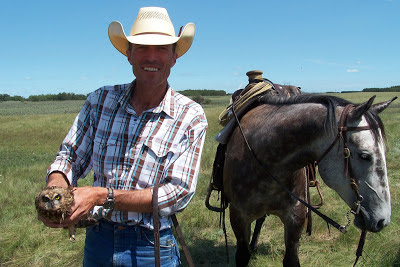 |
| multi-species grazing project at Wolverine Community Pasture, summer of 2012, image courtesy of Brian Payne |
Today's post was a story sent to me by Brian Payne, one of Canada's most experienced multi-species grazing practitioners. Last summer the Wolverine PFRA pasture north of Lanigan, Saskatchewan--which is one of the best pieces of native grassland in the entire Aspen Parkland eco-region and one of the ten pastures put up for sale by the Province--used Brian and his herd of 700 Boer goats to knock back the brushy growth that can take over in our more northerly pastures where moisture levels are higher. This is but one example of the progressive, visionary approach to range management that has been placed at risk by the Federal government's decision to cut the PFRA loose.
The "goat camp" Brian refers to in this story is a spot near the big lake in the pasture where he camped for more than a month with his herd, living in a small camper--Brian, 700 goats and five dogs that specialize in protecting goats from coyotes.
I will let Brian tell the rest of the story, but it is a vivid testimony to the lively culture of our public grasslands--part of this province's heritage and rural character that we will lose if we do not take measures to ensure that something like the PFRA system is put in place to continue serving the needs of local cattle producers and the wider public interests of conservation and ecological health.
It was a hot, early August day on the Wolverine pasture near
Lanigan, when my goat camp was visited by Eric Weisbeck, the pasture
manager. As we discussed the brush management work the goat herd was
doing, Eric noticed something moving in the distance. We thought at
first it might be a lone goat that got separated from the herd. Without
any hesitation Eric decided to take his horse and investigate. He joked
that this would be his first experience at herding a goat on horseback
and we chuckled as he rode off into the distance.
The other rider who was accompanying Eric began to talk
about the changes to the pasture that he had seen over his lifetime in
the area. Over the decades, native, short grass prairie had slowly been
replaced by scrub brush like bufffalo berry and silver willow. Aspen
groves and wild rose were also doing their best to reduce the cattle
grazing acreage at Wolverine. As the sun beat down, we discussed
cattle-only grazing and the lack of fire suppression as probable causes
for this productivity decline in the pasture.
Eric was now off his horse and working at something near the fenceline.
My companion and I speculated that he was probably replacing some
staples or loose wire and got back to the beauty of the landscape that
surrounded us. I talked about my cleansing dips in the pristine little
lake, the multitude of minnows that accompanied every swish of my
washcloth and the coyote scat that made me realilze I shared my swimming
hole with others! I knew that my grandson would love this place. It was
a "froggers dream". I couldn't rinse my dishes or pump water for my
goats without disturbing large numbers of frogs on the lakes edge or the
muskrat that shared the shoreline with us.
" Spooney Lake's wild inhabitants had been truly blessed by their
protection through the PFRA pasture system"; I mused, as we watched Eric
return to the camp. My rider friend commented on the fact that we were
in the middle of a bunch of Tipi rings and asked if I had seen the
hunter's blinds and the old Buffalo jump on the other side of the lake.
After nodding an affirmative, I added my own stories of archaeological
discovery while chasing goats over the surrounding area. We both
marveled at the persistence and strength of the eastern European
pioneers who had tried to settle in the area. All that remains of the
farms that were abandoned are silent and overgrown monuments in stone.
Fencelines, foundations and perhaps
even dams provide silent testimony to their struggle for existence on
this sub-marginal land.
Eric was now within sight and we turned our attention to what he had
found hanging on the fenceline. A short-eared owl had caught a wingtip
and it's desperate struggles were what we had seen in the
distance. Severely dehydrated, we put the owl beside the calm waters of
the lake. Eric left with his companion and I spent some time with my new
campsite comrade. We all knew that the owl's chances for survival were
poor. We also all recognized that caring hands had made his last moments
bearable.
 |
| Eric Weisbeck, Wolverine Pasture Manager, holding injured short-eared owl. Image courtesy of Brian Payne |
The
PFRA has created a culture of environmental stewardship that we all
need to understand and appreciate. Eric is just one of many committed
professionals who have maintained and enhanced our public lands. If we
don't protect the land we can never protect the species that inhabit it;
including ourselves.
 |
| image courtesy of Brian Payne |








No comments:
Post a Comment